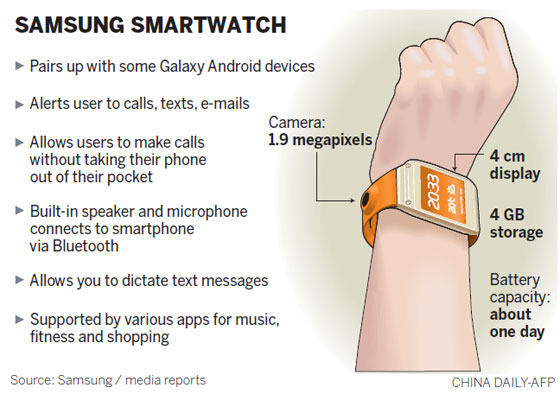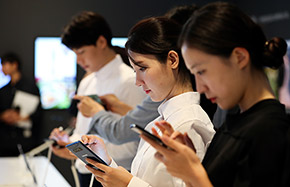Samsung smartwatch unveiled in Germany
By Agencies in Berlin and San Diego, California (China Daily) Updated: 2013-09-06 07:06South Korean electronics giant Samsung on Wednesday unveiled its hotly anticipated smartwatch, the Galaxy Gear, which allows users to make calls, receive texts and e-mails and take photos.
JK Shin, head of Samsung's mobile division, predicted the Galaxy Gear - effectively a mobile you wear on your wrist - would become "a new fashion icon throughout the world" as he launched the device at the IFA consumer electronics fair in Berlin.
So-called smartwatches have been around for several years. But so far, they have failed to attract much consumer interest. That may change with the Samsung Galaxy Gear, which gives the company a chance to pull off the same feat Apple did with the iPad - popularize a device that has lingered mostly unnoticed on store shelves.
The smartwatch has a touch screen just larger than four centimeters set in a brushed-steel mount and wrist straps in six different colors. Contrary to rumors, it does not have a flexible screen.
The company's Galaxy Gear, which will go on sale on Sept 25, also has a tiny camera in its wrist strap.
Samsung is not the first company to introduce a watch that connects via WiFi to a smartphone, alerting its user to calls, texts and e-mails. Casio, Sony and Pebble already have similar products.
However, with its archrival Apple still to roll out its much rumored "iWatch", and the likes of Microsoft and Google not exhibiting at IFA, the South Korean giant has the field more or less to itself to wow the geeks.
Unlike its competitors, the Samsung device allows users to make calls without taking their phone out of their pocket. Instead, they can hold their wrist up to their ear and use the built-in speaker and microphone.
Gadget geeks from all over the world have converged on the German capital this week for the IFA show.
Wednesday and Thursday were reserved for the press. After that IFA opens to the public from Friday through Wednesday to dazzle hi-tech freaks with the latest state-of-the-art gadgets on 145,000 square meters of exhibition space.
In addition to smartwatches, smartphones and tablet computers are certain to be a big draw for visitors, as the dividing line between the two devices becomes more and more blurred, as is demonstrated by the growth of so-called "phablets".
Electronic household goods, such as state-of-the-art kitchen devices - from ceramic hot plates to refrigerators - as well as the latest in flat-screen TVs will also be on display.
Due to falling sales in Germany. flat-screen TV manufacturers are looking to ultra-high-definition devices to spur consumer demand.
Catering to the growing trend of inter-connecting all gadgets, Sony will present a new camera lens that can synch to a smartphone to transform into a powerful camera.
In fact, organizers boast that there will be more world premieres at this year's IFA than ever before.
And while many owners of Internet-enabled TV sets still do not use their devices to surf the web, there is also an information campaign for the "smart TV".
'Wearable' gadget
Qualcomm Inc will also begin selling its "Toq" smartwatch, a wrist-worn device that can play music and handle phone calls and messages, in the fourth quarter, marking the chipmaker's entry into consumer electronics and wearable computing gear.
The company, which dominates the global market for applications processors for smartphones and tablets, introduced the device on Wednesday as Samsung unveiled its own much-anticipated Galaxy Gear in Berlin.
Apple and Google are also widely believed to be working on "wearables" such as wrist-worn devices, in what analysts expect to be the next phase of the mobile communications boom. The exploration of such wearable-computing devices has accelerated in recent years as smartphone growth tapers off.
Qualcomm executives told developers in San Diego it will divulge more details on how to buy a Toq later this month and did not specify a price. Tech blog Cnet reported it will sell for $300, similar to the Samsung's Gear $299 price tag.
The US-based company said its Google Android-powered Toq will be the first smartwatch with a touch-enabled "Mirasol" color screen that can be easily be viewed in bright sunlight.
AFP-AP-Reuters

- China 'incredibly innovative' in many areas: Apple CEO
- City official: Guangzhou further committed to opening-up
- Jack Ma: Globalization backed by technology will cut inequality
- HNA confirms interest in ASEAN's infrastructure investment
- Comments on Xi's letter to 2017 Fortune Global Forum
- China to create more opportunities for the world: Xi
- US tax cuts impact on China two-sided: economists
- Chinese enterprises job fair to be held in Sri Lanka

















